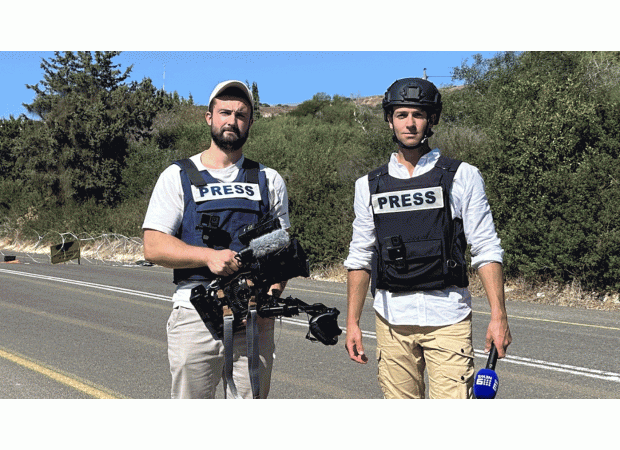A year later, the bodies are gone but the intensity remains unchanged.
9 Europe correspondent and cameraman revisit Lebanon, Gaza, Israel, and West Bank a year after covering initial weeks of war.

It's been a year since Nine Europe correspondent Edward Godfrey and cameraman Nick Marsay reported on the first few weeks of the war on the ground. Now, they have traveled to Lebanon and Gaza border communities, as well as central Israel and the West Bank. The towns near the border with Lebanon are eerily quiet, with almost everyone gone. Many were evacuated by the military months ago, while others left more recently due to the increasing danger in the area.
The new ground battle is just a short distance away, with some communities having the front line just a few hundred meters from their homes. The streets are deserted, and the only sounds are the distant rumble of machine guns and the booms from tanks and jets. In some places, you can see neighboring villages in Lebanon, but they too have been evacuated due to the ongoing clash between Israeli troops and Hezbollah.
One of the towns near the border is Qiryat Shemona, about a kilometer away. This is as far north as you can go, as the IDF has blocked access to the final stretch of road due to its close proximity to Lebanon. The constant rocket fire from Hezbollah makes it too dangerous. The only people in this town are soldiers and one man washing his car on the street. He greets us cautiously at first, but warms up when we explain who we are. His name is David, and when asked why he's still there, he simply replies, "It's my home, I'll never leave." He then quotes a Hebrew saying, "a man's home is his castle," which I tell him we have a similar saying in Australia. We even have a movie about it, which earns a smile from David.
As we continue to drive along the border, we see a fleet of tanks speeding up the mountain towards the front line. We pull over to film, but are quickly stopped by soldiers who are concerned about Hezbollah knowing their movements. Despite our explanation that the footage won't be broadcast for hours, they insist that we stop filming. When we resume our drive, we can hear sirens and see rockets falling in the distance, a constant reminder of the tension in the region.
Further north, in the picturesque port city of Haifa, life goes on as normal for the nearly 300,000 residents. However, there is an air of uneasiness as sirens sound at least twice a day, forcing everyone to take cover. While Israel's hi-tech Iron Dome defense system is effective, it is not perfect. Rockets still manage to land, causing damage and destruction. I see a giant hole in the roof of a housing block, an apartment blown apart, and shrapnel from a rocket or intercepting projectile on the ground.
The damage in Israel is only a fraction of what is occurring in Lebanon, where buildings have been reduced to rubble. Israeli forces have been successful in eliminating numerous senior Hezbollah figures, but innocent civilians are also dying and being injured in the crossfire. The killing of Hezbollah leader Hassan Nasrallah and other senior figures prompted Iran to launch almost 200 ballistic missiles at Israel, an unprecedented attack of twice the scale of its previous one in April.
As our flight descends towards Tel Aviv, we suddenly change direction and land in Cyprus due to a security situation in Tel Aviv. We learn that Israel's airspace has been closed, and our flight is one of many canceled. We spend the next two days and nights at Larnaca Airport, along with hundreds of Israelis trying to get home for the Jewish New Year holiday.
A year on from the war, the level of bombing and artillery fire in Gaza is still shocking to witness. Journalists are still unable to access the strip, but I am able to see the devastation from a barbed wire fence in Kfar Aza, one of the worst affected kibbutzim along Gaza's perimeter. Despite covering the war extensively since last year, I am stunned by how intense the fighting still is. The IDF has refocused their efforts in Gaza's north, and I witness this firsthand in Kfar Aza. The situation is similar to what it was in the earliest days of the war, and it's hard to believe that a year has passed since the October 7 attacks by Hamas, which resulted in the deaths of over 1200 Israelis and the taking of 251 hostages into Gaza.
It has been a year since Nine Europe correspondent Edward Godfrey and cameraman Nick Marsay were on the ground covering the first weeks of the war. In the past year, they have traveled to various locations, including Lebanon, Gaza border communities, central Israel, and the West Bank. Recently, they have returned to the towns just inside Israel's border with Lebanon and have noticed a significant change. The once busy towns are now eerily quiet, with almost everyone gone. Some were evacuated by the military months ago, while others left more recently due to the increasing danger in the area.
The front line of the new ground battle is now close, with some communities just hundreds of meters away from the border. As we walk through the deserted streets, we can hear the distant sound of machine guns and tanks. In some places, we can even see neighboring villages inside Lebanon, which have also been abandoned due to the ongoing conflict between Israeli troops and Hezbollah.
We come across a man named David, who is washing his car on the street. He greets us with suspicion, but his demeanor changes when we explain who we are. When asked why he is still here, he proudly tells us, "It's my home, I'll never leave." He then says something in Hebrew, which roughly translates to "a man's home is his castle." He is determined to stay, despite the constant danger. As we talk, we hear a loud boom from a nearby Israeli tank firing at a target in southern Lebanon. It startles us, but David seems used to it. He shows us where a Hezbollah rocket had landed on his property in the past.
We continue to drive along the border, and our attention is drawn to a fleet of tanks rushing up the mountain in the distance. As we pull over to film, we are approached by soldiers who are concerned about Hezbollah detecting their movements. After a brief negotiation, they insist that we do not film, and the tanks disappear over the top of the mountain. The tension in the air is palpable, and we can hear sirens sounding and rockets falling in the distance.
One of the main targets of the ongoing attacks is Haifa, a picturesque port city in the north. It is home to Israel's largest oil refinery and military sites, making it a prime target for Hezbollah. The city's residents try to go about their daily lives as best they can, but there is an air of uneasiness. Sirens go off frequently, and we all have to take cover. Despite the effectiveness of Israel's Iron Dome defense system, rockets still manage to land, causing damage and injuring innocent civilians.
As we explore the damage caused by the constant rocket fire, we are shocked by the destruction we see. Buildings have been reduced to rubble, and even when rockets are intercepted, large burning debris falls to the ground. The damage here is only a fraction of what is happening in Lebanon, where entire buildings have been destroyed. Israeli forces claim to have eliminated many senior Hezbollah figures in the past year, but innocent civilians continue to suffer in the crossfire.
The tension between Israel and Hezbollah continues to escalate, with Iran also getting involved. We were on a flight to Tel Aviv when the captain announced that we were diverting to Cyprus due to a security situation. We later learned that Iran had launched almost 200 ballistic missiles at Israel. We spent the next two days at the airport, trying to get on a rescheduled flight along with hundreds of other Israelis trying to get home for the Jewish New Year holiday.
It has been a year since the October 7 attacks, when Hamas stormed southern communities, killing over 1200 Israelis and taking 251 hostages into Gaza. Journalists are still not allowed to enter the strip, so we can only see the war from a distance. As we visit Kfar Aza, one of the worst affected kibbutzim along Gaza's perimeter, we are shocked to see that the intensity of the bombing and artillery fire is still the same as it was a year ago. The IDF's focus has shifted to Gaza's north, and we can see the effects through a barbed wire fence.
As we reflect on the past year, we are still shocked by the level of violence and destruction that continues to plague this region. It is a never-ending cycle of attacks and retaliation, with innocent civilians caught in the crossfire. We can only hope for a resolution and peace to come soon.






